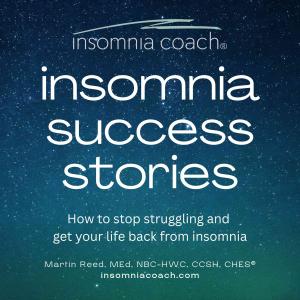Insomnia Coach® Podcast

A conversation about insomnia and anxiety with clinical psychologist Nick Wignall (#7)
Listen to the podcast episode (audio only) Nick Wignall is a clinical psychologist who specializes in cognitive behavioral therapy for anxiety disorders and insomnia. He's also a writer interested in how we can use the tools and insights of behavioral science to better achieve our personal growth and development goals. In this episode, we talk about insomnia as an anxiety disorder rather than as a sleep disorder, the pros and cons of acceptance and commitment therapy for insomnia, why sleep hygiene is rarely helpful, and why CBT-I is typically the best option for people with chronic insomnia. Click here for a full transcript of this episode.Click here to hide the transcript. Martin Reed: Welcome to The Insomnia Coach Podcast. My name is Martin Reed. I believe that nobody needs to live with chronic insomnia and that cognitive behavioral therapy for insomnia (CBT-I) techniques can help you enjoy better sleep for the rest of your life. Martin Reed: I want to say thanks for being on with us today, Nick. Nick Wignall: Sure, thanks for having me. Martin Reed: So, just to get the ball rolling then, tell us how you got interested in the field of sleep, and insomnia in particular. Nick Wignall: Mm-hmm (affirmative). I didn't study it at all in grad school, which is strange it didn't come up at all. But then, right as I was starting my first postdoc, I was asked to do a review of a book by a couple psychologists named, Colleen Carney and Rachel Manber who are big in the CBT-I world. I just thought it was ... I didn't know anything about sleep, but I was asked to do this review. So I thought, "Sure." And I reviewed this book and I was just blown away by this whole world of CBT-I, cognitive behavioral therapy for insomnia. I was a trained cognitive-behavioral therapist, but I had never heard of CBT-I before. Nick Wignall: Everything I read was like, "Wow, this makes so much sense." It was almost too good to be true. It all made a ton of sense. So, when I started working I took on some insomnia clients, and thought, "Well, hey. Does this actually work? Let's see." So, that was kind of the start, and then I started going to conferences, and reading more, and taking on more insomnia clients. And of course, I learned a lot more. But it was that initial thing of reading that book which, kind of did it for me. Martin Reed: So when you decided to try this out in the real world, how did it work? Was it straight away you were just thinking, "Wow! This really is getting results straight away"? Or was it more a case of trial and error as you were actually implementing it in the real world? Nick Wignall: I think I lucked out, in that my first couple cases of insomnia were pretty ... They weren't super severe, and they were pretty straightforward, they didn't have a lot of complicating factors along with them. So they went, frankly, just a pretty good dose of sleep restriction, and some stimulus control really just did the trick for these people. Nick Wignall: And they got a lot of benefit really quickly. But then as I went on, I started getting more complex clients, with some stickier situations, which I learned a ton from, and eventually were successful with. But, it did take some time with some of those more complicated ones. Martin Reed: So, go back to what you were saying earlier, about your initial training in your area of interest was CBT, Cognitive Behavioral Therapy. Nick Wignall: Mm-hmm (affirmative).






 Visit Podcast Website
Visit Podcast Website RSS Podcast Feed
RSS Podcast Feed Subscribe
Subscribe
 Add to MyCast
Add to MyCast